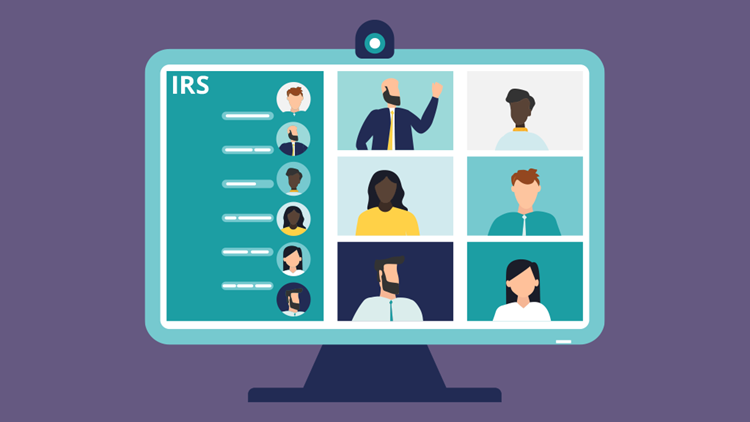by | Oct 16, 2021 | Tax Tips and News
Tax professionals looking for a source of continuing education that satisfies the IRS requirements don’t have far to look.
The Internal Revenue Service has posted 18 new seminars online, recorded during the 2021 Nationwide Tax Forum, on their site, IRS Nationwide Tax Forums Online.
The new self-study offerings use interactive video, PowerPoint slides and audio transcripts to convey vital information and join other sessions recorded previously at prior Nationwide Tax Forums.
All the recorded seminars are available on the site at $29 each.
The newest courses include:
- Advocating for Taxpayers in Order to Avoid Abusive Tax Schemes
- Be Tax Ready – Understanding Rules for Due Diligence and the Child Tax Credit and Earned Income Tax Credit Under the American Rescue Plan Act of 2021
- Charities & Tax-Exempt Organizations Update
- Closer Look at the IRS Independent Office of Appeals
- Collection Flexibilities During Difficult Economic Times
- Common Issues Presented to OPR and Best Practices to Address Them
- Determining an Individual’s Tax Residency Status
- e-Services and You
- Gig Economy
- Helping You and Your Clients Steer Clear of Fraud and Scams
- Key Enforcement Issues
- Keynote Address
- Keys to Mastering Due Diligence Requirements and What to Expect During a Due Diligence Audit
- Overview of Taxpayer Civil Rights
- Professional Responsibility Obligations when Practicing before the IRS: OPR and Circular 230
- Retirement Plans – IRS Compliance Initiatives
- Tax Law Changes from a Forms Perspective
- Virtual Currency
IRS Nationwide Tax Forums Online is a registered, qualified sponsor of continuing education, offering tax professionals—including CPAs, enrolled agents and Annual Filing Season Program participants—the option of screening recorded seminars for a fee to get their continuing education credits.
Earning the credits is easy. Users first create an online account; they’ll have to answer some review questions during the recorded seminar to validate their attendance and pass a short test at the end of the seminar.
All the seminars may be audited for free. However, audited seminars don’t include either the review questions or the final test, so they don’t qualify for credit.
For more information on this option for continuing education credits, check out the IRS Nationwide Tax Forum Information site online.
Source: IRS Tax Tip 2021-151
– Story provided by TaxingSubjects.com
by | Oct 14, 2021 | Tax Tips and News
The Internal Revenue Service this week told “non-traditional families” that they could also qualify for advance payments of the Child Tax Credit.
Family representatives, the IRS urges, should check their eligibility, whether they are parents, grandparents, foster parents or someone who’s caring for siblings or other relatives.
The initial effort to get taxpayers signed up for the Child Tax Credit payments started early in the year, but the IRS says there’s still time to get advance payments in the last months of 2021.
Why claim the Child Tax Credit?
Families that claim the credit for tax year 2021 get up to $3,000 for every qualified child between 6 and 17 years old at the end of 2021. That benefit is $3,600 per child if they are under age 6 at the end of the year.
The advance 2021 payments will total up to half of the taxpayer’s total Child Tax Credit. The remainder is paid out with the refund when the taxpayer files their 2021 return.
Qualifying children can be the taxpayer’s child. But a qualified child can also be a stepchild, an eligible foster child, a sibling (including step-siblings or half-siblings), or even a descendent of these relations—such as a grandchild, niece, or nephew.
How do taxpayers qualify for the Advance Child Tax Credit?
In most cases, a family must have a qualifying child to be eligible for the Advance Child Tax Credit payments. The taxpayer—or the taxpayer’s spouse, if filing jointly—must have their main home in one of the 50 U.S. states or the District of Columbia and has to live there for more than half the year.
There are also certain qualifications the child has to meet in order to qualify for the credit:
- For tax year 2021, a qualifying child is an individual who does not turn 18 before January 1, 2022 and the individual does not provide more than one-half of his or her own support during 2021.
- The individual lives with the taxpayer for more than one-half of tax year 2021. For exceptions to this requirement, see IRS Publication 972, Child Tax Credit and Credit for Other Dependents.
- The individual is properly claimed as the taxpayer’s dependent. For more information about how to properly claim an individual as a dependent, see IRS Publication 501, Dependents, Standard Deduction, and Filing Information.
- The individual does not file a joint return with the individual’s spouse for tax year 2021 or files it only to claim a refund of withheld income tax or estimated tax paid.
- The individual was a U.S. citizen, U.S. national, or U.S. resident alien. For more information on this condition, see IRS Publication 519, U.S. Tax Guide for Aliens.
How do taxpayers sign up for the Advance Child Tax Credit?
For many, the key to getting advance payments of the Child Tax Credit is the IRS’ Non-filer Sign-up Tool. This online tool helps those who don’t normally have to file a tax return qualify for advance child tax credit payments, the recovery rebate credit or Economic Impact Payments (EIPs). All it takes is completing a simplified tax return.
The Non-filer Sign-up Tool will be available through Oct. 15.
Even if a family misses the deadline for advance payments of the credit, they can still file a 2021 return during filing season to get the full amount of the credit as a refund.
Those taxpayers who are required to file a return should check the IRS website in coming weeks, as the Child Tax Credit Update Portal will be updated, allowing families to pass new information about the qualifying children they plan to claim on their 2021 tax return. This will allow the IRS to adjust their monthly Advance Child Tax Credit payments.
Source: COVID Tax Tip 2021-150
– Story provided by TaxingSubjects.com
by | Oct 12, 2021 | Tax Tips and News
The last part of the year is traditionally a good time for taxpayers to check their withholding levels for the upcoming new year. That’s why the Internal Revenue Service recently issued a friendly reminder.
With 2021 going by like a runaway train, it’s easy to just let withholdings slide, thinking what worked this year will work next year.
That, however, may not necessarily be the best strategy. Life is full of unexpected turns; marriage, divorce, a new child or the purchase of a home can all be really good reasons to refigure withholding.
Checking withholding is easy; the IRS has a Tax Withholding Estimator that helps taxpayers decide if they have too much or too little withheld, and how to make a tweak to put more money in their pocket instead of the pockets of the IRS.
The Estimator can also be used to help taxpayers see if they should withhold more or should make an estimated tax payment to avoid a big bill for tax due when they file next year.
The IRS reminds that the Withholding Estimator can also be very helpful to retirees, self-employed taxpayers and others, giving them a step-by-step tool that can tailor the amount of income tax being withheld from wages and pension payments to the actual tax owed.
Points to ponder for 2021
The Internal Revenue Service says there are things to consider when adjusting withholding for 2021:
Income taxes are “pay as you go”
Whether they’re withheld from a paycheck, paid as quarterly estimated tax payments, or a little of both, taxes are generally paid year-round. The IRS, however, figures that about 70% of all taxpayers withhold too much from their income for taxes. This results in a refund at tax time; in 2021, the average refund was more than $2,700.
Taxpayers who need to pay their taxes have some options on just how to send the payment to the Internal Revenue Service. One of the easiest options is to use the IRS2Go app, which allows users to schedule payments for future dates. The feature is handy for payment plan installments, estimated tax payments, or to pay taxes during filing season.
Other options for payment include connecting by phone or going online.
The taxpayer’s online account is a powerful tool that can help keep the taxpayer informed on a number of details surrounding their tax picture:
- The amount of taxes they owe;
- Payment plan details and options;
- The last 5 years of their tax payment history;
- Scheduled or pending tax payments; and
- Key information from their most recent tax return.
Taxpayers can sign into their online account at IRS.gov/account.
More information about taxes, estimated taxes and withholding can be found at Tax Withholding on the IRS website, IRS.gov.
Source: IR-2021-199
– Story provided by TaxingSubjects.com
by | Oct 8, 2021 | Tax Tips and News
Millions of families have been receiving monthly advance payments of the Child Tax Credit. Provided by the American Rescue Plan that was passed earlier this year, these payments have been going to eligible households since July.
As with any tax-related change, taxpayers have understandably had questions. While the “Advance Child Tax Credit Payments in 2021” page on IRS.gov aggregates answers to many frequently asked questions, the Internal Revenue Service this week clarified how child custody can affect the payments—from shared custody to alternating custody arrangements.
How does custody affect eligibility for the Advance Child Tax Credit?
The IRS based eligibility for the Advance Child Tax Credit on the most recently filed tax return. That’s because these advance payments are for tax year 2021, and—obviously—taxpayers won’t file this year’s return until 2022.
Whichever parent claimed the qualifying child (or children) on the most recently filed return has, in all likelihood, already been receiving payments for the past few months. While that seems cut and dry, the situation gets tricky when parents alternate custody for the purposes of claiming the Child Tax Credit. This can result in the parent who claimed a child for TY2020 receiving payments that should—according to their arrangement—go to the other parent.
Taxpayers who receive payments but are ineligible could be on the hook for a pretty big tax bill in 2022. The IRS says the first step these parents should take is unenrolling for payments on the Child Tax Credit Update Portal. However, the IRS notes that “if their custody situation changes and they are entitled to the child tax credit for 2021, they can claim the full amount when they file their tax return next year.”
To read the full press release, check out the source link below.
Source: COVID Tax Tip 2021-147
– Story provided by TaxingSubjects.com
by | Oct 7, 2021 | Tax Tips and News
Everyone likes more choices nowadays, and the Internal Revenue Service is set to deliver. They’re serving up a batch of new self-study seminars for tax professionals.
Eighteen new seminars—recorded in July and August as part of the 2021 Nationwide Tax Forum – are now available through the IRS Nationwide Tax Forums Online.
Tax pros, from CPAs to enrolled agents, Annual Filing Season Program participants and others, can all earn continuing education credits at $29 per credit.
2021 Online Course List
- Advocating for Taxpayers in Order to Avoid Abusive Tax Schemes
- Be Tax Ready – Understanding Rules for Due Diligence and the Child Tax Credit and Earned Income Tax Credit Under the American Rescue Plan Act of 2021
- Charities & Tax-Exempt Organizations Update
- Closer Look at the IRS Independent Office of Appeals
- Collection Flexibilities During Difficult Economic Times
- Common Issues Presented to OPR and Best Practices to Address Them
- Determining an Individual’s Tax Residency Status
- e-Services and You
- Gig Economy
- Helping You and Your Clients Steer Clear of Fraud and Scams
- Key Enforcement Issues
- Keynote Address
- Keys to Mastering Due Diligence Requirements and What to Expect During a Due Diligence Audit
- Overview of Taxpayer Civil Rights
- Professional Responsibility Obligations when Practicing before the IRS: OPR and Circular 230
- Retirement Plans – IRS Compliance Initiatives
- Tax Law Changes from a Forms Perspective
- Virtual Currency
These new seminars join more than 35 sessions from previous years that are also available for credit.
Continuing Education Credits
Nationwide Tax Forums Online is a qualified sponsor of continuing education. The organization is registered with the IRS Return Preparer Office (RPO) as well as the National Association of State Boards of Accountancy (NASBA).
Tax pros have to verify that they completed the seminar. This is done by creating an account, then answering review questions over the course of the seminar, and completing a short test at the end.
While some practitioners may choose the option to view the seminars for free, this choice does not include review questions or the final test—and does not earn any credits.
For more information on the online seminars, see the IRS Nationwide Tax Forums Online.
Source: IR-2021-197
– Story provided by TaxingSubjects.com
by | Oct 6, 2021 | Tax Tips and News
Taxpayers with foreign bank or financial accounts are being reminded that time is running out to file the yearly report of their holdings.
The annual Report of Foreign Bank and Financial Accounts (FBAR) is due on Oct. 15.
The deadline applies to any U.S. citizens, resident aliens or any domestic legal entity holding bank or other financial accounts outside the country.
Originally, the deadline for filing the FBAR was April 15 of this year, but late filers got an automatic extension to file until Oct. 15.
Taxpayers did not have to request the extension.
However, those taxpayers who live in a federally designated disaster area—such as a location hit by a hurricane or tornado—may have their FBAR filing date delayed even further, but should consult the latest FBAR Relief Notices for information specific to their area.
Who should file?
Taxpayers are required by the Bank Secrecy Act to file an FBAR if:
- The taxpayer has a financial interest in, signature authority or other authority over one or more accounts, such as a bank or brokerage account, mutual fund or other financial account located outside the United States, and
- The aggregate value of all their foreign financial accounts exceeds $10,000 at any time during the calendar year.
The Internal Revenue Service wants all U.S. persons or entities who have foreign accounts—even relatively small ones—to see if the filing requirements apply to them.
The IRS defines a “U.S. person” as a citizen or resident of the U.S. This definition also encompasses domestic legal entities, including partnerships, corporations, limited liability companies, estates and trusts.
Filing the FBAR has to be done electronically with the Financial Crimes Enforcement Network, known as FinCEN. Taxpayers are required to use the BSA E-Filing System website to file their FBAR. The report should not be filed with a federal income tax return.
If taxpayers cannot e-file their FBAR, they should call FinCEN at 800-949-2732; taxpayers calling from outside the U.S. should call 703-905-3975.
Simply not filing an FBAR should not be considered an option when the report is required. Those who attempt to avoid filing could face considerable civil and criminal penalties – including fines and prison time.
However, the IRS says it will not penalize a taxpayer who reported an account properly on a late-filed FBAR, if the agency finds a reasonable cause for the missed deadline.
For more information on the FBAR and filing the report, see these resources:
Source: IR-2021-196
– Story provided by TaxingSubjects.com






